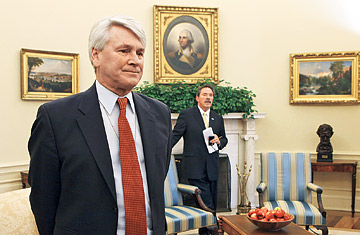
Obama turned to Craig to roll back Bush-era policies in the war on terrorism. But by September, Craig had been sidelined by pragmatists.
(3 of 5)
Hayden didn't give up. He helped organize a group of former CIA directors to lobby Obama aides against the release. George Tenet, the CIA chief who presided over the harshest techniques, called his former aide John Brennan, now Obama's top counterterrorism adviser; Clinton CIA chief John Deutch called Deputy National Security Adviser Tom Donilon. Inside the West Wing, the former directors found that a small group of like-minded allies close to Obama was already forming in opposition to Craig. One was National Security Council (NSC) aide Denis McDonough, a former Senate staffer who has a windowless, low-ceilinged basement office next to the Situation Room--and daily access to the President. On April 15, the day before the extension was set to expire, the President invited eight officers of the CIA's Counterterrorism Center to make their case against release in an Oval Office meeting with Obama. An all-hands, full-dress battle over where to strike the balance between civil liberties and national security was under way.
That night, after dinner with his family, the President called his chief of staff, Emanuel. "I've been thinking about [the memos]," Obama said. "Well, we're meeting on it right now," Emanuel replied.
Obama arrived at Emanuel's office a few minutes later, took off his windbreaker and sat down at a table lined with about a dozen national-security and political advisers. He asked each to state a position and then convened an impromptu debate, selecting Craig and McDonough to argue opposing sides. Craig deployed one of Obama's own moral arguments: that releasing the memos "was consistent with taking a high road" and was "sensitive to our values and our traditions as well as the rule of law." Obama paused, then decided in favor of Craig, dictating a detailed statement explaining his position that would be released the next day.
But for Craig, it turned out to be a Pyrrhic victory. Four days later, former Vice President Dick Cheney attacked Obama on Fox News Channel for dismantling the policies he and Bush had put in place to keep the country safe. More significant was the reaction within Obama's camp. Democratic pollsters charted a disturbing trend: a drop in Obama's support among independents, driven in part by national-security issues. Emanuel quietly delegated his aides to get more deeply involved in the process. Damaged by the episode, Craig was about to suffer his first big setback.
The Fate of Guantánamo Bay
Obama repeatedly promised during the presidential campaign to close the prison at Guantánamo Bay, but Guantánamo proved much easier to say than to do. Craig was under pressure to eliminate related Bush policies that made it infamous: indefinite detention without charge or trial and the use of military commissions--special courts that curtailed defendants' rights.
